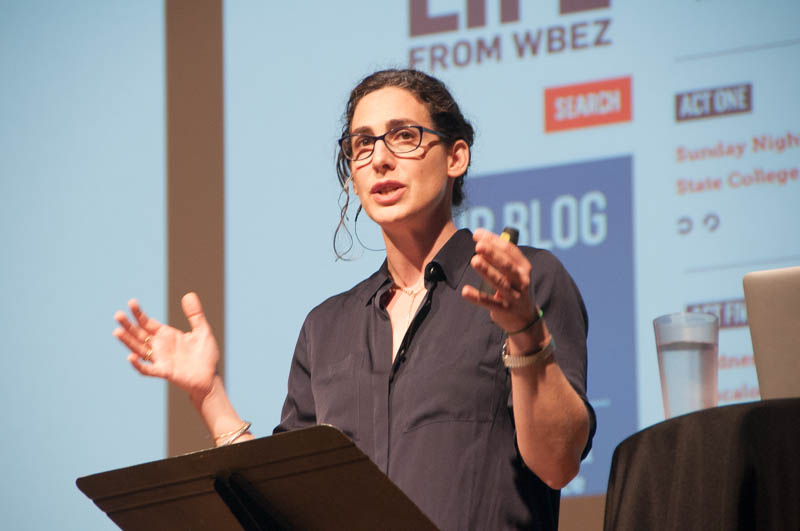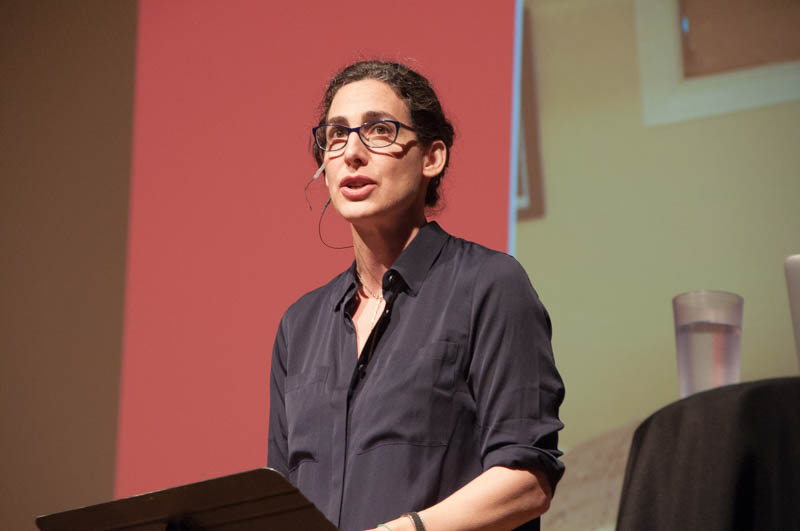When Sarah Koenig released the first episode of her podcast Serial, she was hoping to attract 300,000 listeners over the course of the season. By week six, the podcast had reached five million downloads.
At the end of its second season, Serial has attained more than 217 million downloads. Sarah Koenig, the host and co-creator of the podcast, visited Northwestern Thursday evening as a part of the Contemporary Thought Speaker Series. During a 90-minute speech and Q&A in Ryan Auditorium, Koenig talked about her background, how she structures Serial and what it’s like being at the center of podcast (and pop) culture.
Before Serial, Koenig spent 12 years working at This American Life, the weekly radio program hosted by well-known journalist Ira Glass. At some point, she and her editor, Julie Snyder, had the idea of creating a spin-off podcast. Calling it “This Week,” they wanted to make a show where they would cover stories from the past week – big and small. They created a few test episodes, but the response was tepid.
“At one point, Ira Glass said, ‘Look, if you and Julie really want to do this “This Week” thing, I’m with you, I will support you,’” Koenig said. “But he was like, ‘Before we commit … do you have any other idea?’ And I was like, ‘Well, yeah, actually …’”
Koenig said the biggest lesson she took away from the trial of “This Week” is that a good idea can be easy, and often it is the bad ideas that take a lot of effort to make them passable. Serial was such a good, simple idea that Koenig could record it in her basement. It soon became the most popular podcast in modern history.
The first season of Serial is an investigation of the murder of Hae Min Lee. Adnan Masud Syed, Lee’s ex-boyfriend, is ultimately found guilty of the murder. The season explores the trial and tries to find out if Syed was the real murderer.
Koenig said that she knew people would be following the show as it aired, and that she wanted to make it feel “alive.” She said that the structure had to be loose and forgiving because new evidence was likely to come up while the podcast was airing. To accommodate this, the podcast would be assembled on a week-to-week basis. She said that this caused a lot of stress, and a fear of misrepresenting what had happened is why the show switched to an every-other-week schedule partway through season two.
“The stories that I am often drawn to tend to be pretty dense,” Koenig said. “They are stories that really live in the details. And sometimes for us that really created a storytelling problem.”
Koenig responded by addressing the audience as matter-of-factly as she could. She said that this created a level of interest and empathy as she was making herself vulnerable. However, fighting back against critics, she said that every moment within Serial was intentional, and that while she added her own feelings, the heart of Serial is really in its reporting.
Another reason Koenig said she thinks Serial was so successful was because it resembled television at times. Koenig originally sold the show as a “non-fiction book on tape,” but said she was instructed to market as more of a TV show. She said that her co-creator, Snyder, was instrumental in creating this feel in the series. However, Koenig said that there were quite a few reviews questioning whether it was okay for a show of this content to be so entertaining.
“Pretty quickly, the question became ‘Is this okay?’” Koenig said. “People started asking, ‘Is this okay to do with a non-fiction story?’ Is it to entertaining? It is journalism? Is it responsible? And I would say that that, ‘Yes.’ I would say that artistry is okay in reporting, so long as you stay loyal to the truth.”
Koenig said she was not prepared for the overwhelming popularity of Serial. She said that as a reporter, a large part of the job is not about what you say, but what you don’t say. However, when the Internet gets obsessed with something (as the Internet did with Serial, Koenig said), it tends to want to find every detail it can. This means that a lot of the things that Koenig intentionally kept away from the story rose to the surface on various message boards. Koenig said that it was very hard for Serial to moderate this potentially dangerous and detrimental information.
Although the murder was never officially solved on the podcast, Koenig said that its inconclusive ending was an important part of the narrative. Koenig said that the interesting part of Serial is not who the murderer was, but rather some of the less clear-cut moral questions listeners have to ask themselves. Koenig’s final note was on this concept, and on creating a show that tells just one story over an entire season.
“We are not morons,” Koenig said. “I think we are told so often that we are idiots and we have no attention span and that everything has to be fast. It’s not true. We do have patience for journalism that takes its time.”


